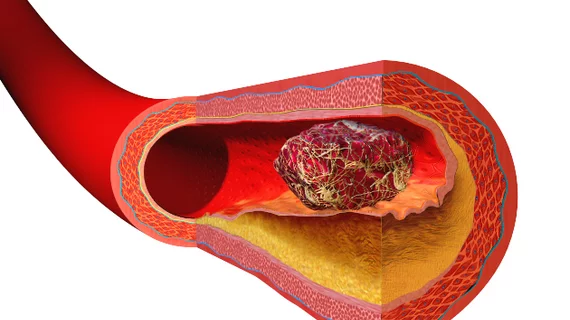Novel antiplatelet could circumvent bleeding risk for stroke patients
The first study to test an experimental antiplatelet compound in humans found the therapy inhibited clot formation without increasing bleeding, suggesting it could avoid that dangerous side effect of other clot-preventing drugs.
“There is a clear need for a novel antiplatelet agent that resolves platelet aggregation and clot formation without raising the risk for bleeding,” senior author Martine Jandrot-Perrus, MD, PhD, a scientist at France’s National Institute of Health and Medical Research, said in a press release. “Such a therapy would considerably improve and expand our current therapeutic arsenal for the treatment of acute stroke.”
Jandrot-Perrus also serves as a consultant for Acticor-Biotech, the company that developed the experimental compound and funded the study, which was published online April 18 in Arteriosclerosis, Thrombosis, and Vascular Biology. The compound, called ACT017, inhibits platelet aggregation by targeting platelet glycoprotein VI—a protein that is crucial to clot formation but doesn’t play a role in regulating bleeding, according to the release.
The drug was tested on 36 healthy volunteers—23 women and 13 men—who were divided into six groups. Six different doses were tested ranging from 62.5 mg to 2,000 mg, with one-quarter of the total dose being delivered within 15 minutes and the rest of the dose being delivered over the next 5 hours, 45 minutes.
All doses of the drug were “well tolerated,” according to the authors, and no infusion site reactions were reported. The therapeutic effects were found to be stronger and last longer at higher doses, but bleeding time was not significantly affected at any dose.
“Our results are quite encouraging because they show the candidate compound is well-tolerated at doses even twice as high as the ones targeted for a future treatment and without any signs of bleeding,” Jandrot-Perrus said. “Another encouraging finding is the fact that the drug’s action on platelets is rapid, specific and largely reversible within 24 hours.”
The researchers said this work with healthy volunteers should pave the way for safety and efficacy studies of the antiplatelet in its target population: stroke patients.

